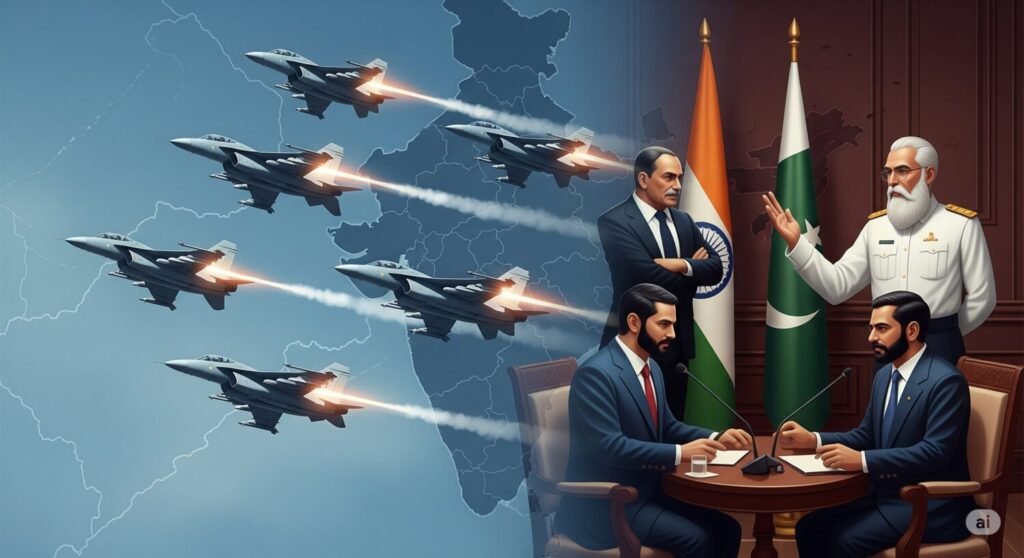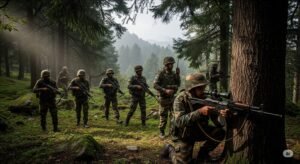Donald Trump’s recent remarks about “Operation Sindoor” and the alleged shooting down of “five jets” have certainly stirred the pot. These statements, made during a private dinner with Republican lawmakers, have brought a previously lesser-known term into the spotlight, sparking discussions and raising eyebrows across the globe. Furthermore, his claims about the resolution of a significant international incident warrant a closer look.
The Unveiling of “Operation Sindoor”
The term “Operation Sindoor” itself refers to India’s retaliatory military operation. This action followed a terror attack in Pahalgam, underscoring a period of heightened tension between two nuclear-armed neighbors. Trump’s mention of this operation, however, introduced a new, unverified detail: the claim that five jets were shot down. Interestingly, he did not specify which country’s aircraft were involved, leaving much to speculation and further inquiry. Consequently, this ambiguity has only added to the intrigue surrounding his statements.
The Ceasefire Controversy
Beyond the alleged downed jets, Trump also reiterated his assertion that the ceasefire between India and Pakistan was a direct result of US diplomatic intervention. This particular claim has been a point of contention for quite some time. Additionally, India has consistently maintained that the crisis was resolved bilaterally, without the need for external mediation. Therefore, Trump’s persistent narrative on this matter highlights a fundamental disagreement on the historical record of a critical international event.
Why These Claims Matter
The implications of such statements are far-reaching. Firstly, they can influence public perception of historical events and international relations. Secondly, they can potentially strain diplomatic ties if not handled with care. Moreover, for a US audience, understanding these claims provides crucial context into the nuances of global politics and the differing perspectives on significant geopolitical moments. It is essential to consider:
- The source of the information and its verification.
- The potential impact on international relations.
- The broader context of the events being discussed.
Ultimately, these claims serve as a reminder of the powerful influence of rhetoric in shaping narratives around complex international incidents. They underscore the importance of factual accuracy, especially when discussing sensitive matters of national security and diplomatic resolutions.
Unpacking “Operation Sindoor”: Trump’s Controversial Claims
Donald Trump’s recent remarks about “Operation Sindoor” and the alleged shooting down of “five jets” have certainly stirred the pot. These statements, made during a private dinner with Republican lawmakers, have brought a previously lesser-known term into the spotlight, sparking discussions and raising eyebrows across the globe. Furthermore, his claims about the resolution of a significant international incident warrant a closer look.
The Unveiling of “Operation Sindoor”
The term “Operation Sindoor” itself refers to India’s retaliatory military operation. This action followed a terror attack in Pahalgam, underscoring a period of heightened tension between two nuclear-armed neighbors. Trump’s mention of this operation, however, introduced a new, unverified detail: the claim that five jets were shot down. Interestingly, he did not specify which country’s aircraft were involved, leaving much to speculation and further inquiry. Consequently, this ambiguity has only added to the intrigue surrounding his statements.
The Ceasefire Controversy
Beyond the alleged downed jets, Trump also reiterated his assertion that the ceasefire between India and Pakistan was a direct result of US diplomatic intervention. This particular claim has been a point of contention for quite some time. Additionally, India has consistently maintained that the crisis was resolved bilaterally, without the need for external mediation. Therefore, Trump’s persistent narrative on this matter highlights a fundamental disagreement on the historical record of a critical international event.
Why These Claims Matter
The implications of such statements are far-reaching. Firstly, they can influence public perception of historical events and international relations. Secondly, they can potentially strain diplomatic ties if not handled with care. Moreover, for a US audience, understanding these claims provides crucial context into the nuances of global politics and the differing perspectives on significant geopolitical moments. It is essential to consider:
- The source of the information and its verification.
- The potential impact on international relations.
- The broader context of the events being discussed.
Ultimately, these claims serve as a reminder of the powerful influence of rhetoric in shaping narratives around complex international incidents. They underscore the importance of factual accuracy, especially when discussing sensitive matters of national security and diplomatic resolutions.









